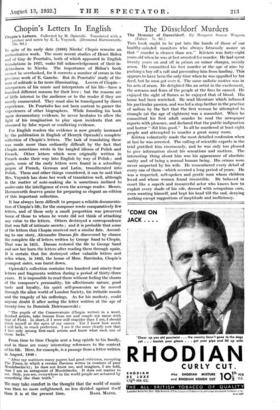The Dusseldorf Murders
The Monster of Dusseldorf. By Margaret Seaton Wagner. (Faber. 7s. 6c1.) This book ought to be put into the hands of those of our healthy-minded monitors who always fatuously assure us that " murder is cleaner than sex." Kfirtem was forty-eight years old when he was at last arrested for murder. He had spent twenty years on and off in prison on minor charges, mainly arson. He committed his first murder at the age of nine by pushing a boy off a raft and preventing him from landing. This appears to have been the only time when he was appalled by his deed, but he soon got over it. The same sadistic motive was in his acts of arson. He delighted like an artist in the excitement, the screams and fears of the people at the fires he caused. He enjoyed the sight of flames as he enjoyed that of blood. His home had been wretched. He read literature which inflamed his particular passion, and was led a step further in the practice of sadism by the fact that the first woman he attempted to strangle (at the age of eighteen) was a masochist. When he committed his first adult murder he read the newspaper' reports with pleasure, and declared that the public indignation' and horror " did him good." In all he murdered at least eight people and attempted to murder a great many more.
Kfirten voluntarily made the most detailed confession when at last he was arrested. The calling of scientific experts in the trial gratified him enormously, and he was only too pleased to give information about his sensations and motives. The interesting thing about him was his appearance of absolute sanity and of being a normal human being. His crimes were never suspected by his wife. He remembered every detail of every one of them—which covered a long period of years. He was a respected, soft-spoken and gentle man whom children loved and whom women found irresistible. He behaved in court like a superb and resourceful actor who knows how to exploit every shade of his rode, dressed with scrupulous care, even scenting himself, and kept his head till the end, denying nothing except suggestions of ineptitude and inefficiency.






























 Previous page
Previous page